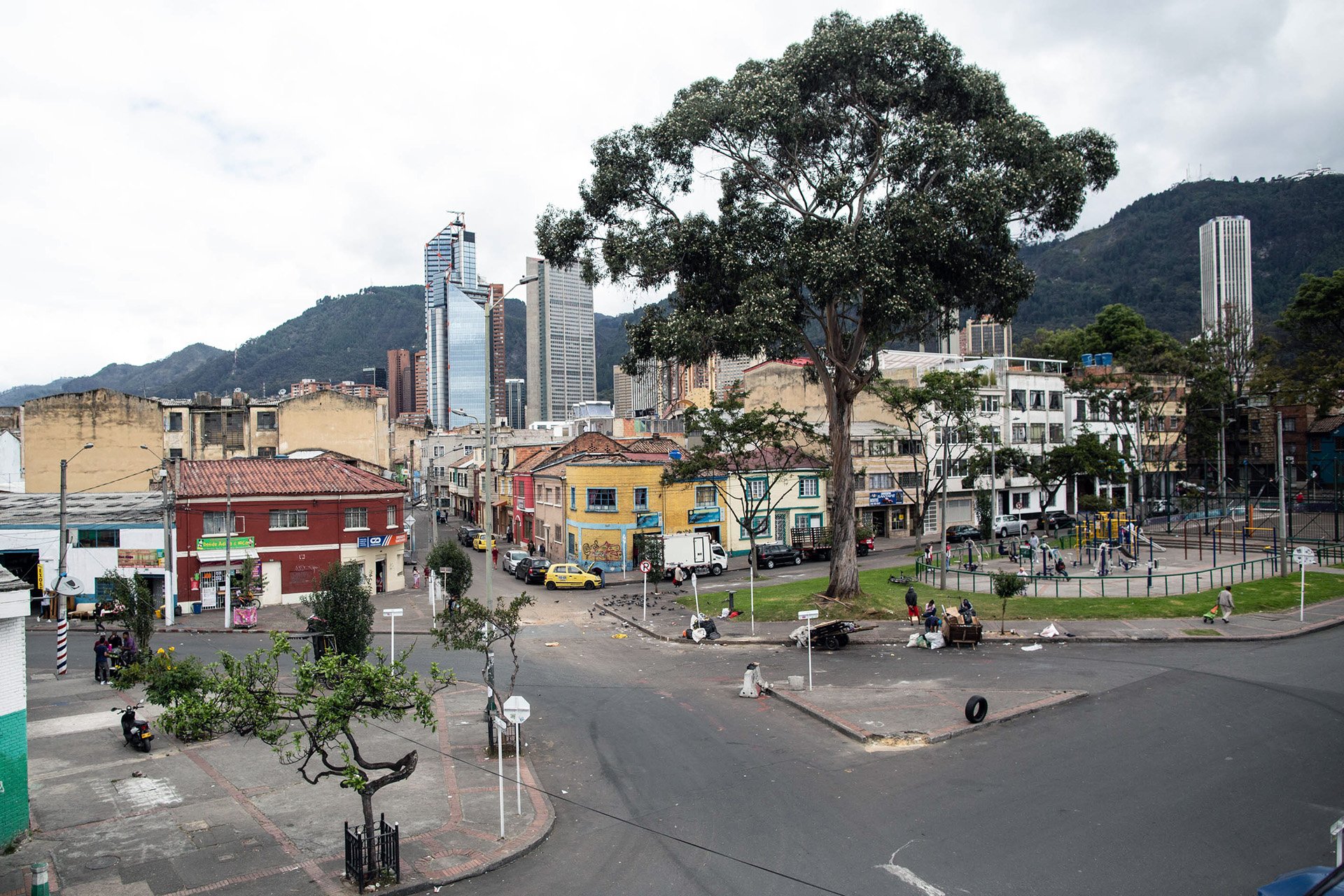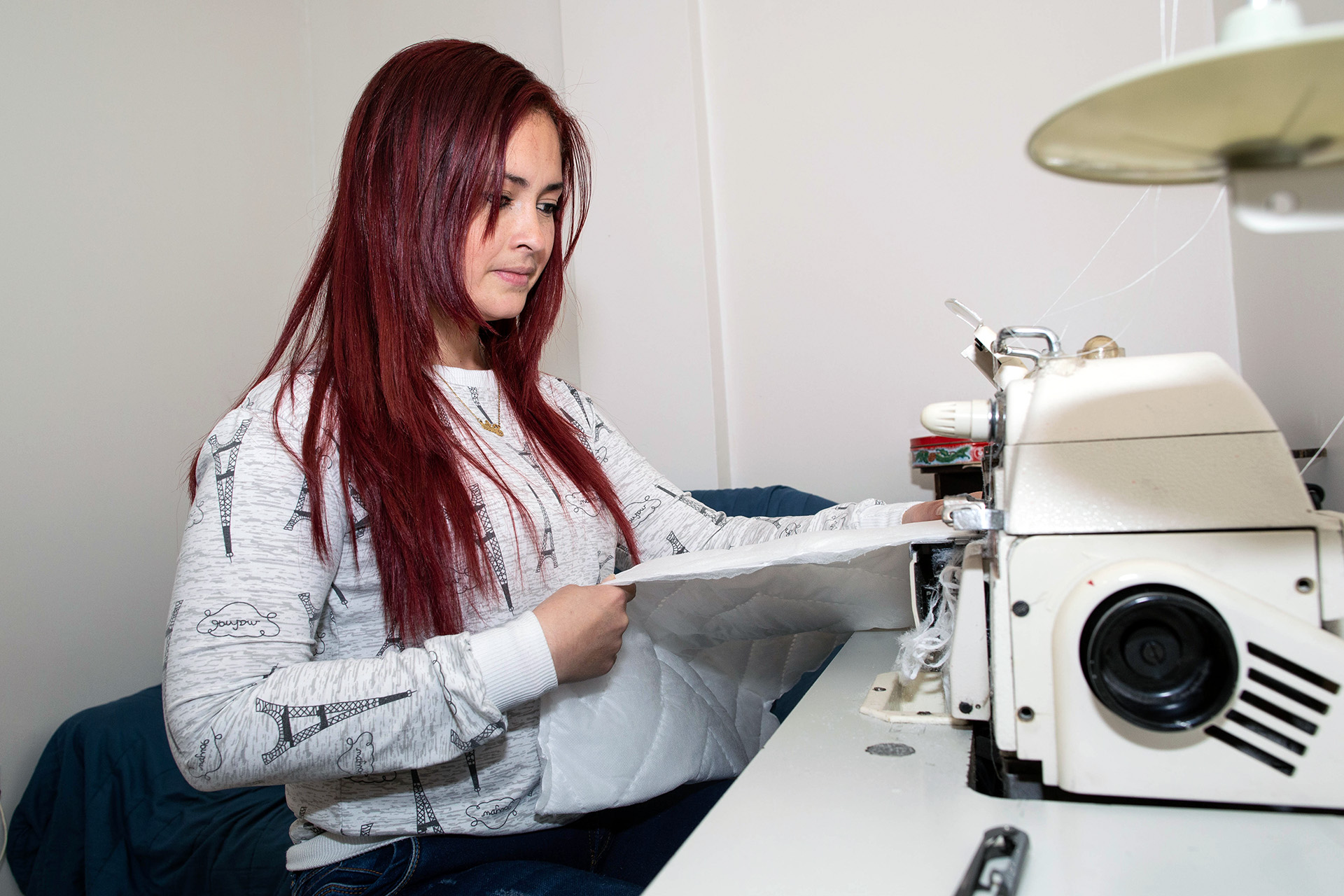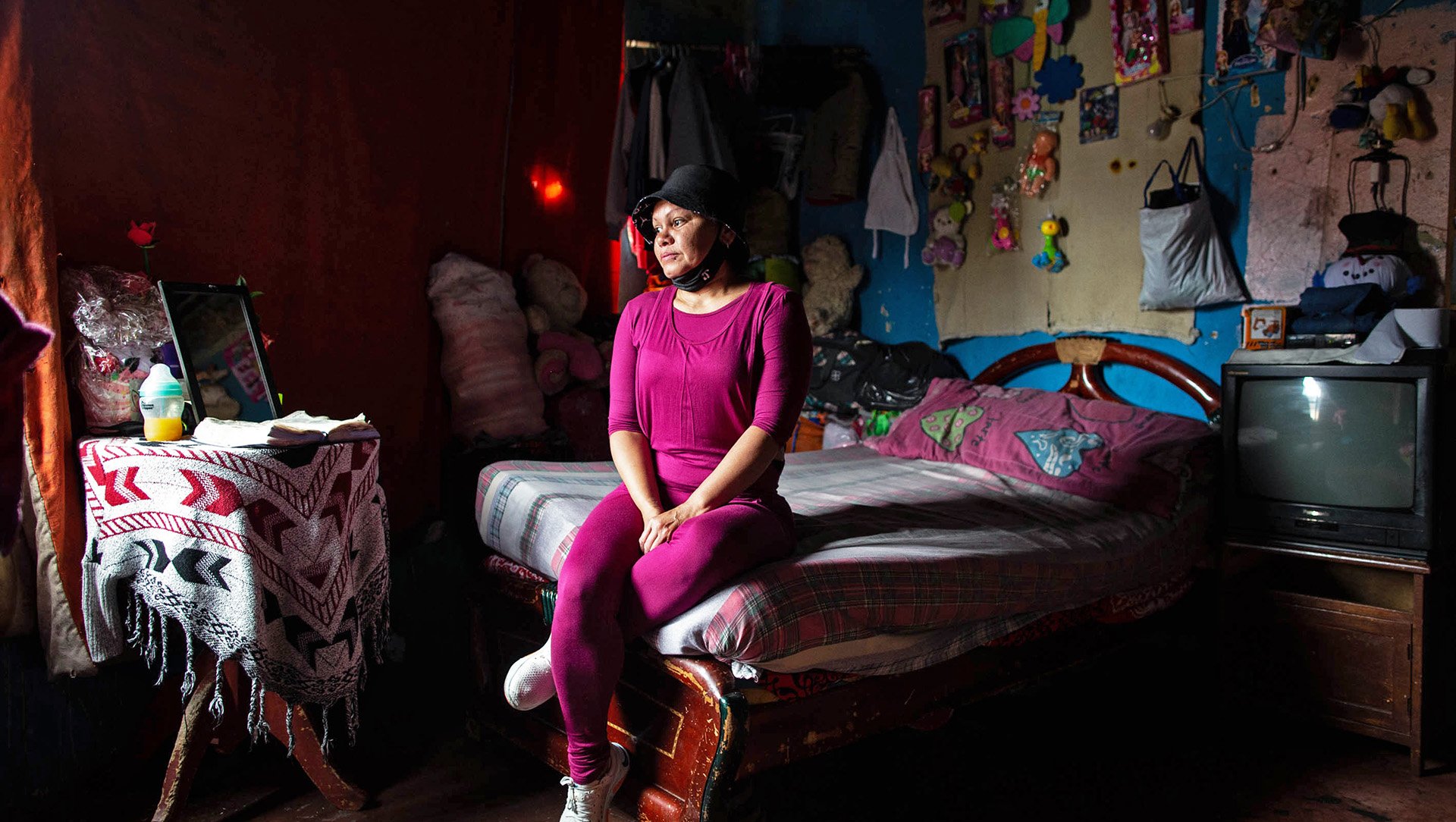A few blocks from the busiest streets of Bogotá’s Red Light district, the Santa Fé neighbourhood, Venezuelan Yohana Zambrano stops in front of a dilapidated four-storey building riddled with broken windows. There is no key, so she knocks on the metal door and a small hatch opens. Two eyes appear and a woman lets her in.
Down a labyrinth of tight corridors, past cracked walls and across wobbly floors covered in layers of carpet, Zambrano, 44, makes her way to the single room she shares with her two daughters and three grandchildren.
Perched on one of the two beds shared by the family of six, Zambrano recounts her worst days battling the fever, chills, and dry cough associated with COVID-19.
She self-medicated with herbal teas, juice, and peppermint, too fearful to go to a hospital because of the wild rumours about what might happen to a Venezuelan there. Tall tales of organ theft and bonuses being paid for each COVID-19 fatality spread lightning fast in the migrant community via social media and WhatsApp messages.
“I was afraid that they would kill me,” Zambrano said.
The truth of what can happen to COVID-19 patients in Colombia is less gory than the rumours, but still sobering. Australia’s Lowy Institute rates 98 countries for their responses to the novel coronavirus, based on the number of cases, deaths, and testing. Colombia ranks 96th, above only Mexico and Brazil. The country had reported more than 2.28 million cases of COVID-19 and 60,676 deaths as of 9 March.
Some 5.5 million people are known to have fled Venezuela since the country’s economy imploded in 2015. President Nicolás Maduro’s government, widely criticised for mismanagement and corruption, has overseen a collapse in Venezuela’s currency, the bolívar, spiralling hyperinflation that has given way to US dollars being used for cash transactions, and the collapse of its key oil industry.
Colombia hosts over 1.7 million Venezuelans, about 983,000 of whom are undocumented. The capital city of Bogotá counts close to eight million inhabitants and is home to an estimated 340,000 Venezuelans, or about 20 percent of the country’s total.
Despite the fact that those with no health insurance, visa, or residency permit are entitled to emergency healthcare in Colombia, in practice many Venezuelan migrants may currently receive no treatment at all.
Duque’s U-turn
In early February, Colombian President Iván Duque announced a dramatic policy shift towards undocumented Venezuelans, saying he would offer the group temporary protected status.
But much remains unclear for Venezuelans, who feel they already face discrimination within Colombia’s health services and are anxiously awaiting more news about whether Duque’s move will open a path to vaccinations and COVID-19 treatments amid growing xenophobia.
On 7 January, as Bogotá entered a month-long “Red Alert” lockdown because over 85 percent of the city’s intensive care beds were occupied, some hospitals began refusing to admit uninsured, undocumented Venezuelans, said Michel Zabala, a lawyer for the Juntos se Puede foundation, a Bogotá-based organisation that helps settle refugees and other migrants. An unknown number of people have died as a result of the hospital policies, she said.

Many Venezuelan refugees and migrants make their way to Zambrano’s grim neighbourhood. Its informal economy – where organised crime and drug dealing flourish, sex work is allowed (and sometimes morphs into trafficking) – offers opportunities to earn a few dollars, enough to stay at one of the many pagadiarios that rent rooms by the day.
Some such rooms, like Zambrano’s, are filled with entire families. Others are shared by strangers. Either way, social distancing is impossible, which heightens the risk of contracting coronavirus.
Despite these conditions, Duque said in December that the country would exclude undocumented Venezuelan migrants from the coming wave of COVID-19 vaccinations. When asked on national radio whether they would receive a vaccine, he responded: “Of course not. We would have calls to stampede the border.”
The announcement added one more spark to the friction between Colombians and Venezuelan migrants that has been building since the start of the pandemic. Colombia's Health Minister Fernando Ruiz, in an apparent attempt at damage control, said all foreigners who reside in Colombia have equal access to Colombia's health system, but Maduro seized on Duque’s comments nonetheless, calling them xenophobic and accusing him of hating Venezuela.
‘Devil in the details’
Duque was also harshly criticised by the international community, and less than two months after his remarks, the Colombian government announced the U-turn, offering a path to formalise immigration status for hundreds of thousands of Venezuelans through a new permit granting 10 years of temporary protection for those who can prove they entered the country before 31 January.
In theory, they’d be guaranteed the right to be vaccinated eventually.
The move won international praise, including from Pope Francis, but many doubt it will be implemented this year, particularly any healthcare or COVID-19 provisions that might result from it.
“The question you need to ask is how quickly does it bring them health benefits,” said Steve Hide, Colombia country coordinator for Médecins Sans Frontières (MSF), which helped to prepare hospitals in rural Colombia, including along the Venezuelan border, to handle the novel coronavirus.
One stumbling block will be whether migrants will be able to prove their identity and document the date they entered the country, both essential to securing legal status, which can take many months.
“The devil is in the details,” said Hide, who called the process “a window of opportunity for migrants to be protected, legalised, and vaccinated”.
Undocumented Venezuelans who formalise their immigration status will in theory be eligible for vaccination through programmes paid for by international donors, according to the team that handles border and migration issues for the Colombian government. For Venezuelans already in Colombia who entered informally and without evidence of their date of entry, leaving the country and re-entering to obtain such proof will be difficult, if not impossible because the border is now closed due to the pandemic.
“The issue of the vaccines will worsen xenophobia in Colombia...Colombians will fear non-vaccinated Venezuelans.”
It’s unclear whether the Colombian government would accept international aid and conduct vaccination programmes for newly formalised Venezuelans itself or if international aid groups might need to mobilise such efforts on their own.
An international aid source told TNH they expected the Colombian government to publish a resolution in March or April – to elaborate on the registration process, on the time frame, and on how migrants and refugees could provide evidence for their entry date. The source, who spoke on condition of anonymity, acknowledged that many uncertainties about undocumented Venezuelans remain, but said most humanitarian organisations will "surely be assisting" regarding the practicalities of vaccinations and permits.
Aid money is required to ensure that shots otherwise destined for Colombian nationals aren’t affected. Venezuelans that cannot formalise their immigration status won’t be vaccinated with state money.
That’s likely to mean Zambrano, who said she has no way of proving her identity or that she’s been in the country for four years, will be excluded, even if she overcomes her fear of Colombia’s healthcare system.
“I don’t have a passport, I don’t have papers, nor do I have a stay permit,” she said.
Vaccine rollout
Ana Karina Garcia, a Venezuelan from Caracas and president of Juntos se Puede, said excluding undocumented Venezuelans would widen social divisions in the country, where competition over jobs in a nation where unemployment stands at 17.3 percent already pits much of the local population against immigrants.
“The issue of the vaccines will worsen xenophobia in Colombia,” she said. “Colombians will fear non-vaccinated Venezuelans.”
From an epidemiological point of view, vaccines only work if a high enough percentage of the population is inoculated.
“If you do not vaccinate the Venezuelans, you’re causing harm to the Colombians as well. The nationality or passport will not prevent you from getting or spreading COVID-19,” Garcia said, adding that Venezuelan migrants and refugees are very mobile. “We need to vaccinate these people so they won’t propagate the virus.”
The government aims to inoculate 35 million people, or about 70 percent of the population, before the end of this year, and has divided the rollout into five phases, starting with frontline healthcare workers and people over 80 years old.

Colombia received its first shipment of 50,000 doses of the Pfizer/BioNTech vaccine on 15 February and more supplies have continued to stream in. By 9 March, 360,635 doses had been administered to patients. There is no guarantee Colombia will acquire enough doses to meet its 2021 vaccination goals. On 1 March, Colombia became the first country in the Americas to receive vaccines through the COVAX initiative, the World Health Organization’s programme to ensure they reach the most vulnerable.
Milanyi Carrero, whose father has been fighting COVID-19 and on a ventilator in a Bogotá hospital since January, said she and other Venezuelans living in Colombia should be offered a vaccine against the deadly virus regardless of their legal status.
“We are all human and have the right” to be inoculated, she said. “The option should be given to the ones with or without papers.”
Carrero, 31, runs a tailoring business from her house in Funza, a town bordering Bogotá.
Her father Hector Carrero, 55, came to visit in November, crossing the border illegally because it’s closed due to the pandemic.
To earn extra cash, Hector took up selling his daughter’s jackets and sportswear on the crowded streets of Funza. By the end of December, he had the first symptoms of COVID-19.
First seen at a hospital in Funza, he was later transferred to a facility in Bogotá, where his lung function fell to 20 percent. Doctors induced a coma and connected him to a ventilator. A hospital social worker has told Carrero that the basic – and discounted – intensive care costs amount to $440 a day, but there are other expenses for services such as the procedure that placed the ventilator tube in her father’s throat.
The bills are adding up despite official government policy.
“Each migrant on Colombian soil should be able to access urgent medical attention in any public hospital in Colombia free of cost, independent of their migratory status. This situation has not changed with the arrival of COVID-19,” a representative of the office that handles border and migration issues told TNH. “That means, [coverage will be paid for] with resources of the Colombian government.”
Nevertheless, public hospitals continue charging undocumented Venezuelans, who are often taken aback by the bills because back home they are accustomed to free, albiet faltering, health care.
“This is where it gets complicated,” said Garcia. “They detain them until they pay.”
In some cases, private security guards are deployed to hold patients at the hospital for days beyond the time they are medically ready to be discharged, which Garcia calls a violation of human rights.
Carrero told TNH she can’t afford to pay, even though the daily care charges have been lowered from $750. The amount for a family of refugees is still too high, she said, and should not be charged for an emergency related to COVID-19.
“We cannot get that amount of money together,” she said.
Jozef Merkx, Colombia director for the UN’s refugee agency, UNHCR, applauded Colombia’s recently announced path to temporary legal status for migrants, particularly because of the high percentage of refugees now in the country. But he said all Venezuelans, including those without legal immigration status, should be treated for COVID-19 without being billed.
Milanyi Carrero still hopes her father will survive the virus. He knew before being connected to the ventilator that he might not, so one of the doctors made a video of him. “He said goodbye to all his children and to my mother,” Carrero said, tearing up.
be/pdd/sll/ag






